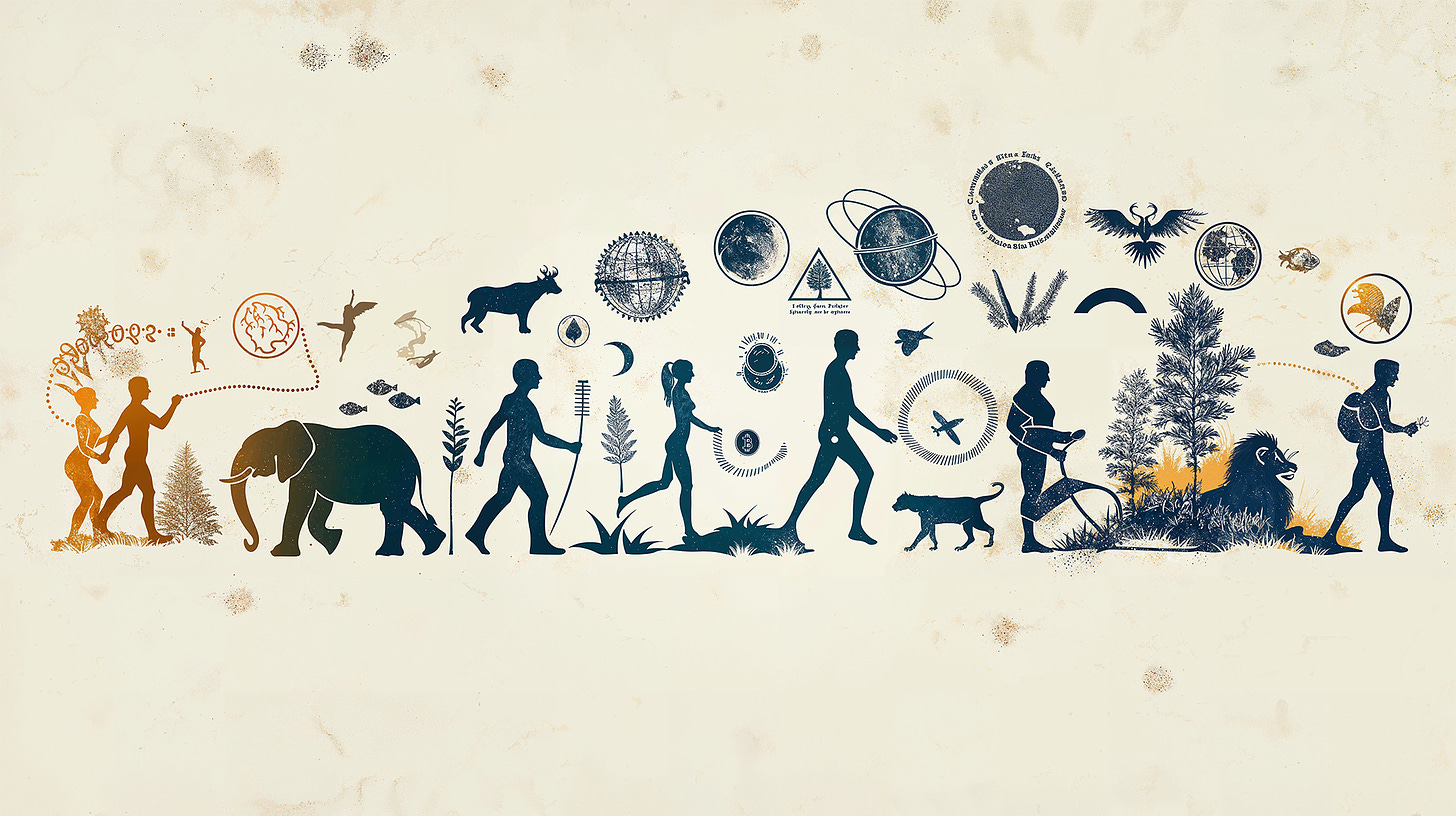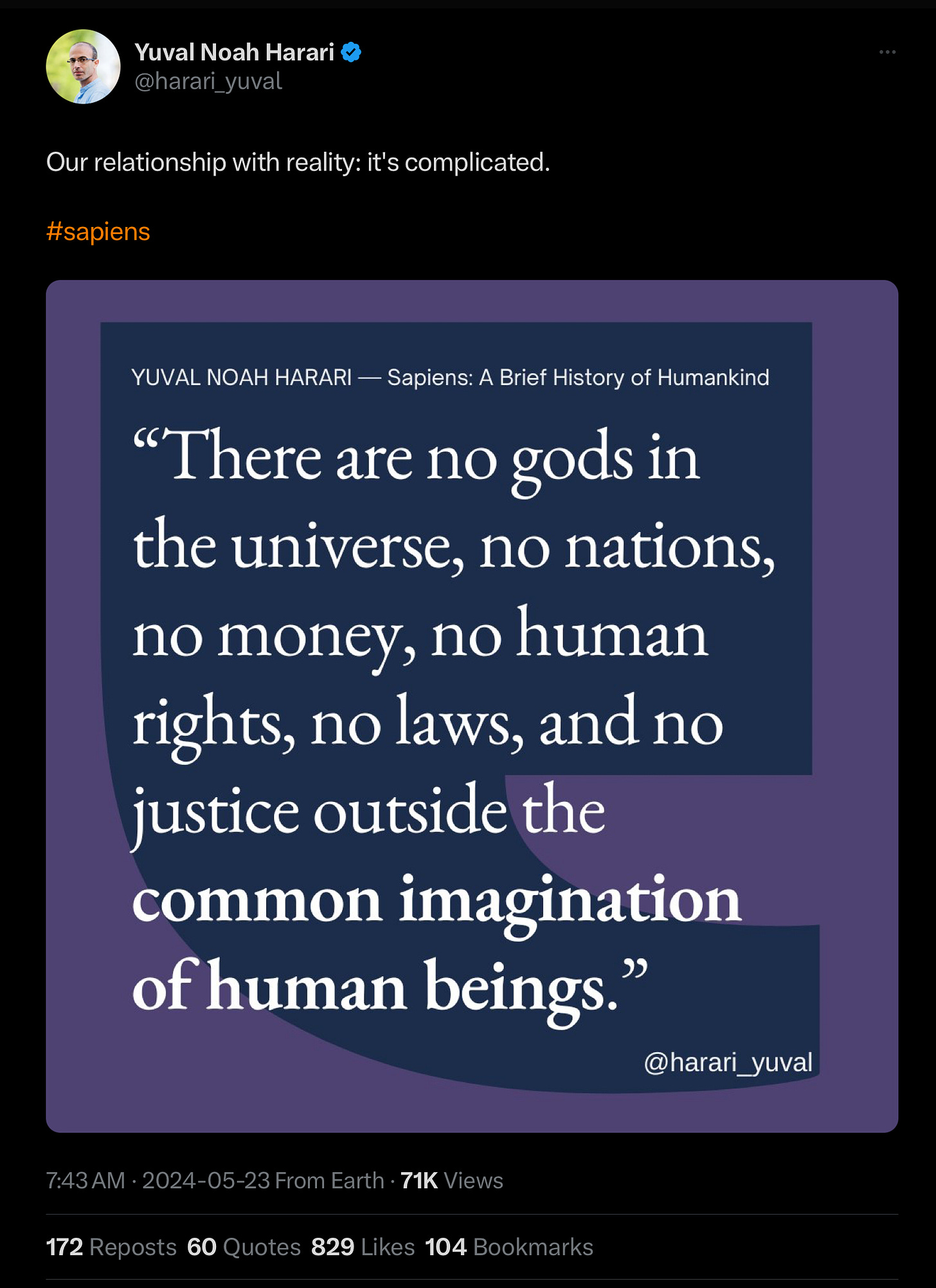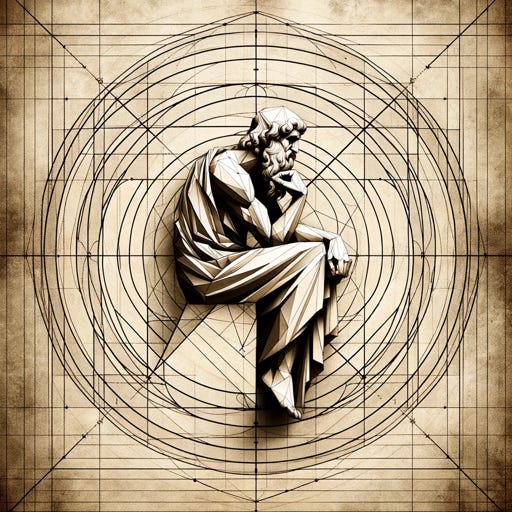A Humanist Critique of Harari's Nihilistic Scientific Reductionism
Harari’s take on our social constructs misses key points about their role in human progress. I unpack why these constructs matter.
Just a couple of days ago, I replied to Yuval Noah Harari's thoughts on Bitcoin. Well, here we are again!
I promise I'm not stalking his Twitter feed; it's just that his posts keep sparking interesting discussions that demand a response.
This time, Harari's take on the complexities of our relationship with reality caught my eye, and I felt compelled to offer a humanist perspective on his reductionist views.
Below, you'll find my detailed critique of Harari's latest statement. I am reproducing my X post below:
Yuval Noah Harari just posted this tweet. I quote above:
Sure, Yuval, it’s complicated, but let’s dig a bit deeper.
First, let me acknowledge that Harari is right—these things don’t exist outside of the human imagination.
Gods, nations, money, human rights, laws, justice—all human constructs.
But what he conveniently leaves out is this: these constructs are the bedrock of human civilization. Our memetics, or "imaginations" as Harari puts it, are critical to the evolution of our species.
It's through these constructs that we navigated from grunting pre-human animals to civilized humans.
These constructs enabled large-scale cooperation and organization, transforming us from a species of isolated individuals into cohesive societies, making us a force to reckon with.
Gods and religions, for instance, are types of "meta stories" or social glue that have historically enabled large-scale organization while maintaining an incentive structure for humans to coordinate. Nation-states and political ideologies are more recent attempts to mimic this role, creating shared identities and purposes.
But here's where humanism comes in.
Humanism itself is a powerful meta story—arguably a superior one. Unlike gods and religions that rely on supernatural beliefs, humanism is grounded in human agency, reason, ethics, and a commitment to human welfare.
It has been the underlying civilizing force all along, often unacknowledged, yet ever-present.
Humanism emerged the moment the first human female expressed her interest in protecting her offspring from the mere brutalities of existence and communicated that idea to her male counterpart, who agreed. Humanism was born at that moment, whether one acknowledges it or not.
It offers a shared narrative that values human dignity, rights, and progress. It is the philosophical embodiment of what it means to be human. Humanism is the evolved meta story that embraces our shared humanity and the potential for collective progress without the need for divine intervention.
Harari’s brutal reductionist honesty about these being mere constructs misses this vital point: that, it is precisely these constructs that have allowed us to rise above our primal origins. They are not just figments of imagination; they are the very tools that have shaped our world and our progress.
While it’s insightful to reduce everything to first principles, let’s also remember that these constructs are the result of our collective imagination and effort. They represent our highest aspirations and our deepest commitments to each other.
So yes, Yuval, our relationship with reality is complicated, but it’s these complications that make us human. It’s the shared stories, the common goals, and the mutual trust that allow us to build civilizations.
What you are doing is trying to undermine the significance of these constructs.
Harari’s reductionist view dismisses the very essence of what makes us human. These constructs are not just figments of imagination of the human hivemind—they are the pillars of human progress and the very fabric of civilization.
This kind of scientific reductionism strips away the values and achievements we've fought for throughout history.
So my friends who are reading this: Humanism is not about holding hands and singing Kumbaya like a group of hippies waiting to be ideologically captured and weaponized by a bunch of communists; it's about recognizing and defending the constructs that define our very humanity and drive our civilizational progress forward. Political Humanism goes a bit further; it politicizes this belief in a participatory manner.
Harari's framing is harmful because it risks the erosion of the very foundations that sustain our societies. He is almost villainously testing those limits to see how much the social fabric can unravel.
By dismissing these constructs as mere products of imagination, he hopes to undermine the importance of our shared values and the social glue that holds us together.
This reductionist view will lead to a cynical outlook, where the achievements of human cooperation are undervalued and the motivation to uphold these constructs is diminished and eventually dismantled. It's a dangerous path that will no doubt weaken the social cohesion and trust essential for any thriving civilization.
When it comes to idea diffusion, Harari's bad speech demands better speech in response. That is why I wrote this response.
We must call out this harmful reductionism and offer a robust defence of the constructs that have driven human progress. It's through this counter-response that we can preserve and strengthen the values and institutions that truly matter.
So, let me sum up before ending this post:
- While Harari accurately identifies that constructs like gods, nations, and laws are human-made, he fails to acknowledge their foundational role in our evolution from isolated individuals to cohesive, civilized societies.
- Humanism, as a superior meta-story, has been a crucial civilizing force grounded in reason, ethics, and collective welfare.
- Harari's reductionist view undermines these essential constructs, risking the erosion of social cohesion and trust.
- By dismissing these constructs as mere imaginations, he overlooks their significance in driving human progress.
- It is imperative to counter this harmful reductionism and defend the values and institutions that uphold our civilization.







